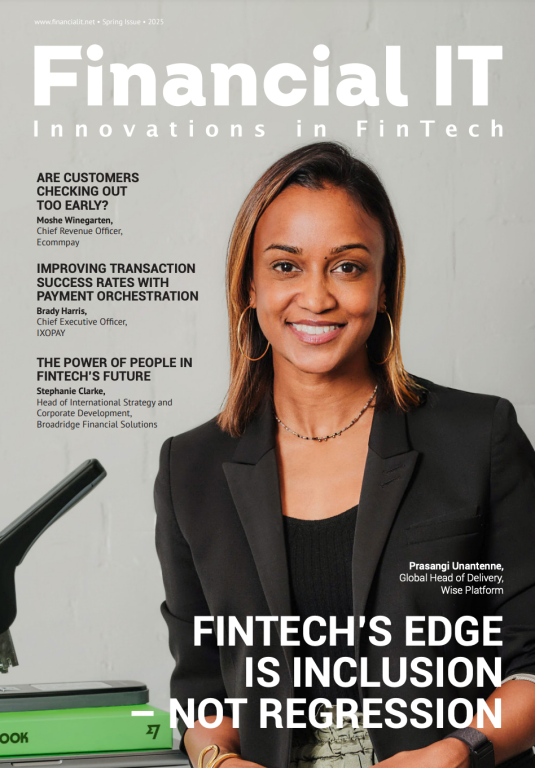Published
- 03:00 am

Highly experienced leader to continue driving Axo's growth and expansion plans.
Axo AS, a leading distributor of personal finance products in the Nordic region, and portfolio company of Corsair, a leading private equity firm targeting services, software, and payments investments in financial services, today announced that Jostein Christian Dalland has been appointed CEO. Mr. Dalland succeeds Carl E. Endresen, who is stepping down from his role as CEO.
Mr. Dalland is a highly experienced leader and entrepreneur with 30 years of international and digital marketing experience. He most recently served as Group EVP and Head of Savings and Marketing at Sbanken, where he had full responsibility for the Savings and Investment unit, and as Chief Marketing Officer, responsible for the brand, customer experience, and data-driven marketing. In addition to CEO roles in several start-/scale-ups he has also served as Groups EVP at Storebrand ASA, Aker BioMarine ASA, and executive management at Orkla Foods.
"On behalf of the Company and Board of Directors, I am delighted to welcome Jostein as our new CEO. He brings deep international and digital marketing expertise and has an excellent track record of managing and scaling digital B2C businesses. His experience is highly complementary with Axo's current strategy and vision and we are confident he is the ideal leader for our next phase of growth," said Didier Bench, Chairman of Axo. "I also want to thank Carl for his contributions and dedication to Axo during his tenure as CEO. We wish him well in his next endeavors."
Mr. Dalland said, "I am honored to have the opportunity to lead Axo and its very talented team. Following the successful acquisition of LendMe, Axo has become the leader in the distribution of personal finance products in Norway and Denmark, and I am excited to play a part in Axo's next phase of growth to become the premier pan-Nordic platform for personal financial products. I look forward to working with the Board to ensure the Company continues to innovate and develops solutions that strengthen our offerings to both consumers and banking partners."
Derrick Estes, Partner at Corsair Capital, commented: "Jostein is a highly seasoned executive with significant industry experience and a strong vision for the future of the Nordic consumer financial services market, making him an ideal fit to lead the company forward. We are excited to work with him to support Axo's strong growth trajectory and continue positioning the company for long-term success."
Related News
- 08:00 am

The Finance Magnates London Summit is taking place 16-17 November 2021 and key players in the finance space are preparing to meet in London. Since its launch in 2012, the London Summit has earned the trust of key finance and fintech influencers and is renowned for generating business, networking and the famous FMLS awards. Attendees will include financial sector thought leaders, retail brokers, payment service providers, fintech startups, crypto exchanges, retail and institutional brokers, and technology brands.
There will be an action-packed agenda this year with top speakers and cutting-edge discussions. We’re counting down to the event and sharing some of the event’s top attractions. There’s still time to register to attend the summit. Sign up here
Business Booster
Finance Magnates, the team behind the London Summit, understands the finance sector and the importance of great networking. Getting to know the attendees of the London Summit is key for a successful conference. Register and connect with the right people, set up meetings, arrange coffee and plan your schedule in advance. Get started now
Floor Plan
Our floor plan is complete and live on our site so you can plan your meetings and figure out where everyone will be. There will also be refreshments including complimentary coffee, water and donuts provided by our sponsors! Check out the floor plan.
The Networking Blitz Opening Party
The Networking Blitz opening party sponsored by Alogateway will kick off this year’s summit. The Networking Blitz opening party will start at 5pm on Tuesday, November 16 in the Vault Room at Old Billingsgate. Representatives from the biggest and most respected brands in the industry will be waiting to catch up and do business.
TIP- The bar is cashless and only credit cards will be accepted.
Vote for Your Favourites in The FMLS Awards
Voting is open for the FMLS awards and we’re down to the final round! The Finance Magnates London Summit awards celebrate the achievements of leading brands that excel in the online trading space. The awards ceremony adds to the excitement of the summit as the winners will be announced live at the ceremony on 17 November. Vote for your favourites now!
We have an incredible line up of sponsors for the Finance Magnates London Summit and we want to thank them for helping to facilitate such a great event. Check them out here and meet them at the summit.
Ready to experience all this and more in London? Register here.
Related News
- 08:00 am

Strategic partnership positions OTP Group and the Ministry for Innovation and Technology (ITM) of Hungary as the European AI leader, enabling rapid transformation across the bank and the region for the next decade
SambaNova Systems, the company building the industry’s most advanced software, hardware and solutions to run artificial intelligence (AI) applications, and OTP Group, the leading banking group in Central and Eastern Europe (CEE), today announced a strategic partnership to build the fastest AI supercomputer in Europe. Together, they will deploy a multi-rack AI system, built on SambaNova Dataflow-as-a-Service GPT, for the most advanced language model in the world at a commercial bank. The system will be provided as a national AI resource to the public sector, private industry, and higher education in cooperation with the Ministry for Innovation and Technology (ITM) of Hungary.
“This is a unique collaboration between OTP Group, ITM, and SambaNova Systems to provide an incredible resource to the country and the Central and Eastern European region,” said Péter Csányi, Deputy CEO, head of Digital Division at OTP Group. “We are pleased to announce that this groundbreaking supercomputer will represent a unique AI capability to build GPT-3 level language models for languages across CEE.”
With this partnership, OTP Group takes the European lead in AI research and development. The Bank’s 17 million customers will experience faster, more personalized AI-based financial services with a supercomputer that can process large amounts of text-based information and data in a short time. By significantly speeding up workflows and taking over repetitive tasks, creating more space for service development and human creativity, the innovation will have a positive impact on OTP Group’s employees across Europe.
“OTP Group has an impressive industry-leading plan to make AI its key technology driver for the next decade. With the support of ITM, the AI environment that they’re creating will provide accessible, cutting-edge infrastructure for universities, research centers, public and private organizations across Hungary,” said Prof. Dr. László Palkovics, Minister for Innovation and Technology in Hungary.
The partnership between OTP Group and SambaNova Systems is a multi-year collaboration agreement to deploy SambaNova’s Dataflow-as-a-Service GPT solution and build a one-of-a-kind Hungarian language model, one of the most complicated languages in the world, to be followed by the unique languages of other OTP Group countries. With this implementation, the bank will transform itself with AI and the power of SambaNova GPT, cutting across every corner of the enterprise, from the front office to the back office.
“Large language models are quickly becoming the primary interface to the enterprise and AI will drive the transformation of industries. This deployment at OTP Group will showcase what’s possible with advanced AI across document-heavy industries, such as banking and financial services,” said Rodrigo Liang, co-founder and CEO of SambaNova Systems.
The deployment is a technical feat; the project, had it been developed and deployed in-house, would have taken the bank several years and extensive human capital resources. With SambaNova, OTP Group can deploy in days or weeks. Once deployed, this AI supercomputer will enable OTP Bank to advance forward with AI and make further inroads across the global financial market.
Related News
- 01:00 am

Sber and its subsidiary SberCloud, a cloud service provider, have presented Russia’s all-new high-performance supercomputer Christofari Neo. Executive Vice President of Sberbank, CTO of Sber, and Head of Technology David Rafalovsky presented the supercomputer at the international conference AI Journey 2021.
The performance of Christofari Neo approximates 12 PFLOPs (11.95 PFLOPs). The supercomputer uses solutions by NVIDIA, a global leader in AI. At the core of the supercomputer are A100 Tensor Core GPUs, which deliver unprecedented acceleration at every scale for AI, while their 80 GB memory allows users to work with large AI models and data pools.
Christofari Neo is perfect for training and inference when it comes to transformer models with the latest architecture trained on large data sets. SberDevices and Sber AI teams were the first to have pilot access to Christofari Neo. Thanks to ML Space, the SberDevices team switched between the supercomputers seamlessly, optimizing the costs and speed of training for the ruGPT-3 & family transformer models available for further training and testing on SberCloud.
David Rafalovsky, executive vice president of Sberbank, CTO of Sberbank Group, head of Technology:
“The Christofari Neo supercomputer will enable Sber to bring computing speeds to the next level, unlocking new opportunities for us to implement breakthrough services and products with underlying cutting-edge technology. SberCloud’s current and new customers will have access to the capacities of two supercomputers at once. The important thing that has remained unchanged is the ease of use of the new supercomputer since Christofari Neo is closely integrated with the ML Space and Christofari platforms. This means customers can access the performance they need as quickly and easily as ever.”
Related News
- 09:00 am

According to the Robo.cash corporate statistics, the social and geographic shifts of the investors' audience is expressing the growing market potential.
The Robo.cash platform has significantly expanded its active investor base in 2021, representing a more than 70% growth. In addition to engaging an increasing audience, the market continues to penetrate various segments of the society. For example, the share of female investors on Robo.cash (among registered customers) grew from 20% in 2019 to 34% in 2021.
There is also a more active involvement of the younger generation. At the moment, the share of Generation Z investors has reached 4%. On the contrary, the share of millennials is slightly decreasing from 52.2% in 2019 to 51% in 2021.
It is worth noting the geographical shifts in the P2P market. Thus, the share of German investors on the Robo.cash platform decreased by 7% since 2019 due to the activation of the rest of the European investors. Since 2019, the share of Spanish and Italian investors has grown by 5% and 2% accordingly. France gained more than 3% and entered the top five, displacing Portugal.
"As Robo.cash statistics show, European P2P lending is becoming an integral part of an enlarging number of people from various social groups”. - platform analysts comment. “Despite the evident increase of the active P2P investors on the platform, it is still too early to talk about reaching the pre-crisis level of the P2P market as a whole, but investor confidence, expressed in fact in monetary terms, is definitely recovering steadily”.
Related News
- 07:00 am

- The Money Talks card game will combine questions around money habits with a fun twist to help break the stigma around money
- Launching in collaboration with some of the UK’s most popular podcasters on the Acast Creator Network, including Vicky Pattison, Kate Thornton and comedy duo Will Mellor and Ralf Little, listeners will be able to hear the hosts play the game first-hand. Listeners will hear the worries and habits their favourite hosts have experienced and be encouraged to start their own conversations with their friends
- The limited edition physical game will be up for grabs, with the game available online from 8th November
Klarna, the leading global banking, payments and shopping service, has launched the Money Talks card game to spark genuine and meaningful conversations around spending, saving and shopping to help break the stigma around money.
Informed by the Social Vulnerability Scale, which is proven to foster closeness in conversation through mutual vulnerability, Klarna’s Money Talks card game will facilitate open and honest discussions between players in a positive and fun way. Reflecting the Scale, the game comprises of three levels and a wildcard round, with each level touching on a different theme including relationships, personal habits, mindsets and financial basics.
Launching in collaboration with some of the UK’s most popular podcasters on the Acast Creator Network, including Vicky Pattison, Kate Thornton and comedy duo Will Mellor and Ralf Little, listeners will be able to hear the hosts play the game firsthand. Listeners will hear the worries and anxieties their favourite hosts have experienced and be encouraged to start their own conversations with their friends.
There will be physical copies of the game up for grabs from the Money Talks card game homepage, with winners randomly selected from a raffle.
Emily Thomas, UK Consumer PR Lead at Klarna said, “Sparking honest conversations about money is the first step in reducing the stigma and anxiety surrounding this taboo topic. At Klarna, we are dedicated to educating our users about responsible spending and encouraging financial wellness. The Money Talks card game will do just that, by having fun but also opening up honest discussions around spending, shopping and wellbeing.”
Related News
- 08:00 am

Pleo announces new speakers from Zendesk, GoCardless and Hubspot for virtual leadership summit “Forward” to celebrate, challenge and inspire the future of business leadership
Forward is a one-day conference featuring 25+ speakers and 15+ sessions focusing on business leadership, product innovation and people management.
Fintech scale-up Pleo, the smart spending solution, continues to strengthen and diversify the speaker roster of its inaugural leadership conference ‘Forward’, taking place Thursday 9th December. Adding to the already 20+ strong list of industry leaders attending Forward, Pleo is now excited to welcome a range of new speakers including; Morten Primdahl, Founder of Zendesk, Ben Knight, Head of Sustainability at GoCardless and Katie Burke, Chief People Officer of Hubspot.
These experts will join the likes of speakers from Spotify, Netflix, Hopin and Airbnb, to be a part of the digital-first event, bringing together business leaders, industry thought-leaders, academics and futurists for one day to celebrate and discuss the future of business leadership. Other inspirational speakers, including Pen Hadow, Arctic Explorer and Ocean Conservationist, Futurist Ravin Jeusathan and Charlotte Sweeney OBE, Author of Inclusive Leadership, will also explore wider topics related to their personal experiences, and the future role of business within society.
Forward will involve a mixture of keynote talks, fireside chats, panels and curated workshops to address challenges businesses are facing while also looking ahead to a positive future. The digital event will lean into recent and emerging trends across business and leadership – exploring pressing topics such as mental health, diversity inclusion and equity. Other sessions will also reflect on product innovation, and how businesses can implement and build better solutions to support the future workforce.
Pleo is also pleased to announce Nathalie Nahai as the MC for Forward, who will lead the event, set up discussions and address future trends. Nathalie is a Psychologist and Host of the Hive Podcast as well as an international speaker, consultant and author of two books: Business Unusual, and business best-seller Webs of Influence: The Psychology of Online Persuasion. Her work explores the intersection between persuasive technology, ethics and the psychology of online behaviour, with past clients such as Google, Accenture, Unilever and Harvard Business Review, among others.
Confirmed speakers include:
Pen Hadow, Arctic Explorer and Ocean Conservationist
Alex Stephany, CEO of Beam
Morten Primdahl, Founder of Zendesk
Joi Thailon Ngo Torres, Global Inclusion + Diversity, Expedia
Kim Scott, Author of Radical Candor and CEO Coach
Geoff Mcdonald, Co-founder of Minds@Work, BBC Contributor and Former Global VP of Unilever
Marc Mckenna Coles, Diversity, Belonging and Inclusion Lead at Spotify
Karen Tobiason, Ex-CPO at Nordea and Phillips, and Author of the Heart Revolution
Jessica Neal, Chief Talent Officer at Netflix
Reshma Sohoni, Partner at Seedcamp
Sarah Manning, VP of People at Hopin
Quasar 'Q' Hamirani, Global Head of People Operations at Airbnb
Charlotte Sweeney, OBE, Author of Inclusive Leadership
Ravin Jeusathan, Futurist, Author and Global Leader of Transformation at Mercer
Jeppe Rindom, co-Founder & CEO of Pleo
Katie Burke, Chief People Officer, Hubspot
Ben Knight, Head of Sustainability, GoCardless
Olov Eriksson, Chief Product Officer at Pleo
Daniel Illes, Head of People at Vinted
Karina Howley, Head of Corporate Citizenship + Diversity, KPMG
Nathalie Nahai, Best-selling author and host of The Hive podcast
Peter Mulhmann, Founder of Trustpilot
Jeppe Rindom, Co-founder & CEO at Pleo, says:
“At Pleo we’ve seen first-hand how significantly the pandemic impacted our customers over the last two years. But although times have certainly been tough, it's inspiring to hear stories of innovative businesses surmounting challenges and beginning to thrive again in 2021. This is part of the reason we’re incredibly excited to be launching Forward - so we can hear the inspiring stories of leaders and founders, and learn from them to build even stronger foundations for the future of business. We’re looking forward to welcoming attendees from all backgrounds to Forward, and hope it is merely the beginning of an exciting platform for business leadership.
Registration for Forward is now available via the official landing page, here: https://pleo.io/en/forward
Related News
- 05:00 am

SberCloud, a supplier of cloud services which forms part of the Sber ecosystem, has created a special hybrid version of its ML Space platform - ML Space Private. This was announced by David Rafalovsky, Sberbank Group CTO and Executive Vice President, at the international conference AI Journey 2021.
ML Space from SberCloud is a platform for full-cycle ML development and joint work by DS teams on the creation, training and deployment of machine learning models. The platform contains tools that are familiar to data scientists and has pre-installed popular libraries and frameworks. It speeds up, optimizes and greatly simplifies model development, testing and deployment processes through the ability to use individual GPU V100 and A100 cards or the entire capacity of two supercomputers.
ML Space Private offers absolutely all benefits of a public ML Space. Yet at the same time, it can be deployed in a hybrid regime – i.e., part of the platform can be installed on the client’s severs, while the other part performs computing tasks in the SberCloud cloud.
If required, ML Space Private can be certified to meet the information security requirements of any company.
Companies can also integrate the platform with their infrastructure and business services, such as service catalogs, billing systems, monitoring systems, logging, ITSM and so on.
The platform is popular amongst both Sber’s own ecosystem developers and data scientists in companies of any size and research organizations. In just one year it has been used by 1.5 thousand people from around 250 teams. In that time, they have used 2.5 petabytes of data and 300 mln GPU minutes.
David Rafalovsky, Sberbank Group CTO and Executive Vice President:
“SberCloud regularly receives requests from a wide variety of companies to work with the ML Space on-premises, because for one reason or another these companies are unable to use public cloud services. Of any providers – not just ours. Specifically for these clients we have created a special version of the ML Space platform – ML Space Private. I’m confident that this upgrade will open up broad opportunities to employ the most advanced ML technologies for many companies that have been unable to use the services of cloud providers due to regulatory or other restrictions. Anybody who is interested can already submit an application to the website to test ML Space Private in operation”.
Related News
- 09:00 am

Cyber consultants call on businesses to act now, or risk budgets shrinking further in ‘real terms’ during 2022 – leading to increased cyber vulnerability
The cyber budgets of UK enterprises actually shrank (-1%) during the pandemic, according to their cyber budget holders. This left cyber spend stagnating at an average of around £18 million ($24.9 million) for the 2021 financial year. This is despite the fact that 79% reported having suffered a major cyber incident. Of this group, the majority (73%) had experienced an incident in the past three years.
Over half (54%) of organisations either ‘hit pause’ or decreased their cyber budgets during the pandemic. Now, IT leaders expect to increase their cyber budget by an average of 7.4% in the next twelve months, taking the average budget to £19.4 million. But taking into account inflation, which is currently 3%, this still may not be enough to make up for lost time during the pandemic. If this trend continues, a cyber spending ‘deficit’ will emerge that makes businesses more vulnerable to cyber incidents, as attacks become more frequent and more sophisticated.
The problem is compounded by a lack of confidence among decision makers in how they spend their cyber budgets:
- 40% said their organisation needed a better understanding of how to prioritise areas for cyber investment.
- Half (50%) reported they had a cyber strategy but had not been able to fully implement it – meaning that cyber investments are not realising their full potential.
“Businesses need to act now to lock in their cyber spending for next year,” said Jamie Smith, Head of Cyber Security at S-RM. “The readiness with which we saw businesses pull back their budgets during the pandemic is concerning. Next year’s cyber budgets cannot be futureproofed against all forms of disruption, but there are trends business leaders should watch closely. A major one is the rising cost of cyber insurance - premiums are going up. This is because cyberattacks are becoming more frequent. What’s more, insurers are looking to reduce the risk they take on when they provide cyber policies. As a result, insurers want companies to prove how cyber resilient they are before providing cover.”
“UK cyber budgets shrunk at a time when the cost of cybercrime and frequency of attacks is increasing at an alarming rate. The average immediate damage of a cyber incident is in the region of £1.3 million,. But the secondary costs like higher insurance premiums and recovery services can more than double this.”
“Businesses have been failing to keep pace, and if they don’t commit to strategic investment in their cyber security, they risk serious financial and reputational damage.”
The analysis, developed by S-RM, will guide UK organisations who are looking to utilise their cyber spend more effectively. It also found a clear correlation in the data which suggests that cyber confidence comes from the top. Businesses with boards who had a highly proactive approach to cyber security were more likely to say they are investing cyber budget in all the right places (73%) compared to those who do not experience proactive support from the top (44%).
Related News
- 08:00 am

Islamic Finance Heading Towards New Destination
The leading Islamic Finance consultancy services provider AlHuda Centre of Islamic Banking and Economics successfully organized International Conference on Ijarah (Islamic Leasing) and Takaful. The event was held on 10TH -11TH November, 2021 at Radisson Blu Sisli Hotel, Istanbul Turkey with collaboration of Leasing Association of Uzbekistan and Islamic Corporation for Development of Private Sector. ICD-IsDB is one of the premier Islamic multilateral financial institutions working for the development of the private sector including the Ijarah industry. The lead sponsor for this event was Caiz Holding AG and the technology partner was Codebase Technologies. The media partner for the conference is Web-TV powered by ProShare and Islamic Finance Weekly Nigeria. The conference hosted delegates from Canada, Malaysia, Uzbekistan, Germany, Dubai, Pakistan and Turkey.
The conference agenda was to explore a new horizon for Ijarah (Islamic Leasing) and evaluation of new dimensions to the world of Takaful. This event projected Islamic finance, its challenges, global reach and future prospects, Ijarah (Islamic Leasing), products, innovative value addition in its product line, Shariah Compliance, Operational aspects, Ijarah Sukuk (Innovative solution to Governing bodies and Islamic Capital market), and Takaful (Islamic Insurance).
In the inaugural session, the Chief Guests were Mr. Ihsan Ovut (Secretary General), The Standards and Metrology Institute for Islamic Countries (SMIIC), and Mr. Botur S. Yusupov (Deputy Chairman) Leasing Association of Uzbekistan. AlHuda CIBE arranged an impressive lineup of 17 speakers from different countries on the subject matter to explore more options for Ijarah (Islamic leasing) and Takaful industry. Mr. Pervez Nasim (Chairman and CEO) Ansar Financial Development Corporation (Canada), Dr. Levent Sumer (Chairman) SMR Strategy Turkey, Ms. Ebru Cetin (Head of Turkey) The Digital Insurer, Mr. Muhammad Salman Anjum (Chief Executive) InvoiceMate, (Head of BSV Blockchain) in MENA and South Asia and many other leading names of industry have participated in the event.
Addressing to the audience, the organizer of International Islamic Leasing Conference, Muhammad Zubair Mughal Chief Executive officer said that Islamic Finance Industry is growing all over the world, for its future direction we need to remove barriers for developing it as equally beneficial alternative financial system. Ijarah is a very convenient product to launch in those jurisdictions where there is no proper legal and regulatory environment available to facilitate Islamic banking and financial products, he added. He argued that due to this feature Ijarah products can be introduced effectively and efficiently in financial markets without introducing any additional legal and regulatory framework for enabling environment for Islamic finance products.
Muhammad Zubair Mughal said that Takaful is a key to unlock the independence of men. He highlights the concept of Takaful based on solidarity, shared responsibility, and brotherhood among communities to cooperate and be mutually responsible for each other's unwanted uncertainties and financial damages. While narrating the theme and core purpose of the 2nd International conference on Ijarah (Islamic Leasing) and Takaful, Muhammad Zubair Mughal resonated his thoughts that economic prosperity and well-being massively depends upon banking and finance sector in any country around the world. It is also noteworthy that those sectors are growing. In this connection the Islamic Banking and Islamic finance sectors have shown tremendous emergence globally by double digit growth from the last several years.
The conference will be followed by One Day “Post Event Workshop on Islamic Leasing” dated November 12, 2021. This Workshop will cover a variety of allied topics. To learn more about please visit: https://www.alhudacibe.com/icit2021/.









